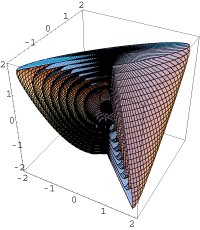 The Dynamics of Mapping Classes on Moduli Spaces
The Dynamics of Mapping Classes on Moduli Spaces
A special session on the interaction between the topological transformations of a surface and its associated geometry.
Organized by:
Richard J. Brown, American University
Special Session #1003: Joint Meetings of the American Mathematical Association and the Mathematical Association of America, Atlanta, Georgia
January 5 - January 8, 2005
Purpose:
There is currently great interest in the study of the geometric structure spaces of a surface (moduli spaces) via the representation and character varieties of its fundamental group, and in the separate study of the mapping class group of the surface. The action of the latter on the former forms a discrete dynamical system which links the topology of the surface to its geometry in a highly structured fashion. Thurston's classification of the mapping class group of a surface is based on its action on an appropriate closure of Teichmuller space, a component of the PSL(2,R)-character variety of the surface group. And in "Ergodic theory on moduli spaces," (Ann. Of Math 1997), Goldman takes the initial steps in understanding the general dynamical system. In this special session, we highlight this interaction as a way to gain information on both the acting mapping class group, and on the moduli spaces. This session hopes to assess the current focus and future directions of this subject among some of the core group currently studying the field. Since this topic brings together researchers from many different fields (topological dynamics, ergodic theory, low-dimensional topology, and representation theory, to name a few), this session will facilitate the sharing of their ideas and on developing a common theme and shared goals.
Participants:
- Tara E. Brendle, Cornell University
- Richard Douglas Canary, University of Michigan
- Moon Duchin, University of Chicago
- Charles Frohman, University of Iowa
- William M. Goldman, University of Maryland
- Elmas Irmak, University of Michigan
- Rinat Kashaev, Université de Genève
- Nikolai A. Krylov, International University Bremen
- Dan Margalit, University of Utah
- Walter Neumann, Barnard College, Columbia University
- Joseph P. Previte, Pennsylvania State University at Erie
- George Stantchev, University of Maryland
- Peter Storm, Stanford University
- Ser Peow Tan, National University of Singapore
- Richard A. Wentworth, Johns Hopkins University
Schedule:
- Friday January 7, 2005, 8:10 a.m.-10:50 a.m.
- Saturday January 8, 2005, 1:00 p.m.-5:50 p.m.
- 1:00 p.m.
Relative mapping class group of S^p\times D^q$.
Nikolai A. Krylov*, International University Bremen
(1003-55-767)
- 1:30 p.m.
Automorphisms of the Hatcher-Thurston Complex.
E Irmak*, University of Michigan
M Korkmaz, Middle East Technical University
(1003-58-726)
- 2:00 p.m.
The Mod(S)-action on the variety of PSl(2,C)-characters.
Juan Souto, CNRS
Peter Storm*, Stanford
(1003-53-720)
- 2:30 p.m.
Dynamics of the Automorphism Group of the $GL(2,\mathbb{R})$-Characters of a Rank Two Free Group.
George Stantchev*, University of Maryland at College Park
William Goldman, University of Maryland at College Park
(1003-53-1018)
- 3:00 p.m.
Dynamics of the mapping class group on the moduli of a punctured sphere with rational holonomy.
Joseph P Previte*, Penn State Erie
Eugene Z Xia, National Cheng-Kung University Taiwan
(1003-57-680)
- 3:30 p.m.
Weil-Petersson isometries.
Dan Margalit*, University of Utah
(1003-20-576) Talk slides: Postscript, PDF - 4:00 p.m.
Homological action of the modular group on some cubic moduli spaces.
Walter D Neumann*, Barnard College, Columbia University
William M Goldman, University of Maryland
(1003-57-552)
- 4:30 p.m.
Generalized Markoff Maps and McShane's Identity.
Ser Peow Tan*, National University of Singapore
Yan Loi Wong, National University of Singapore
Ying Zhang, National University of Singapore
(1003-22-398)
- 5:00 p.m.
Deformation theory of hyperbolic 3-manifolds.
Richard Douglas Canary*, University of Michigan
(1003-57-1686)
- 5:30 p.m.
An Ergodic Theorem for Random Walks on the Mapping Class Group.
Moon Duchin*, University of Chicago
(1003-37-1722)
Other recent work in the field:
 The Dynamics of Mapping Classes on Moduli Spaces
The Dynamics of Mapping Classes on Moduli Spaces The Dynamics of Mapping Classes on Moduli Spaces
The Dynamics of Mapping Classes on Moduli Spaces